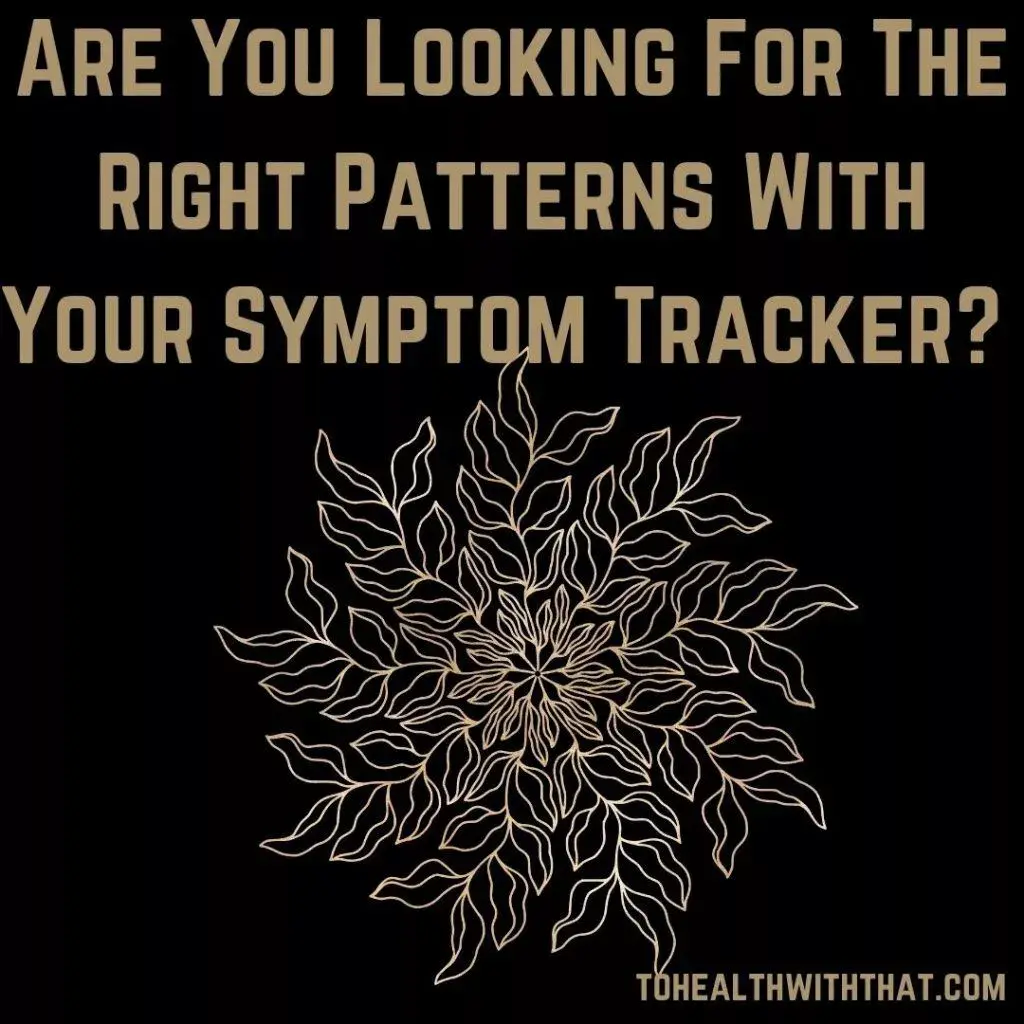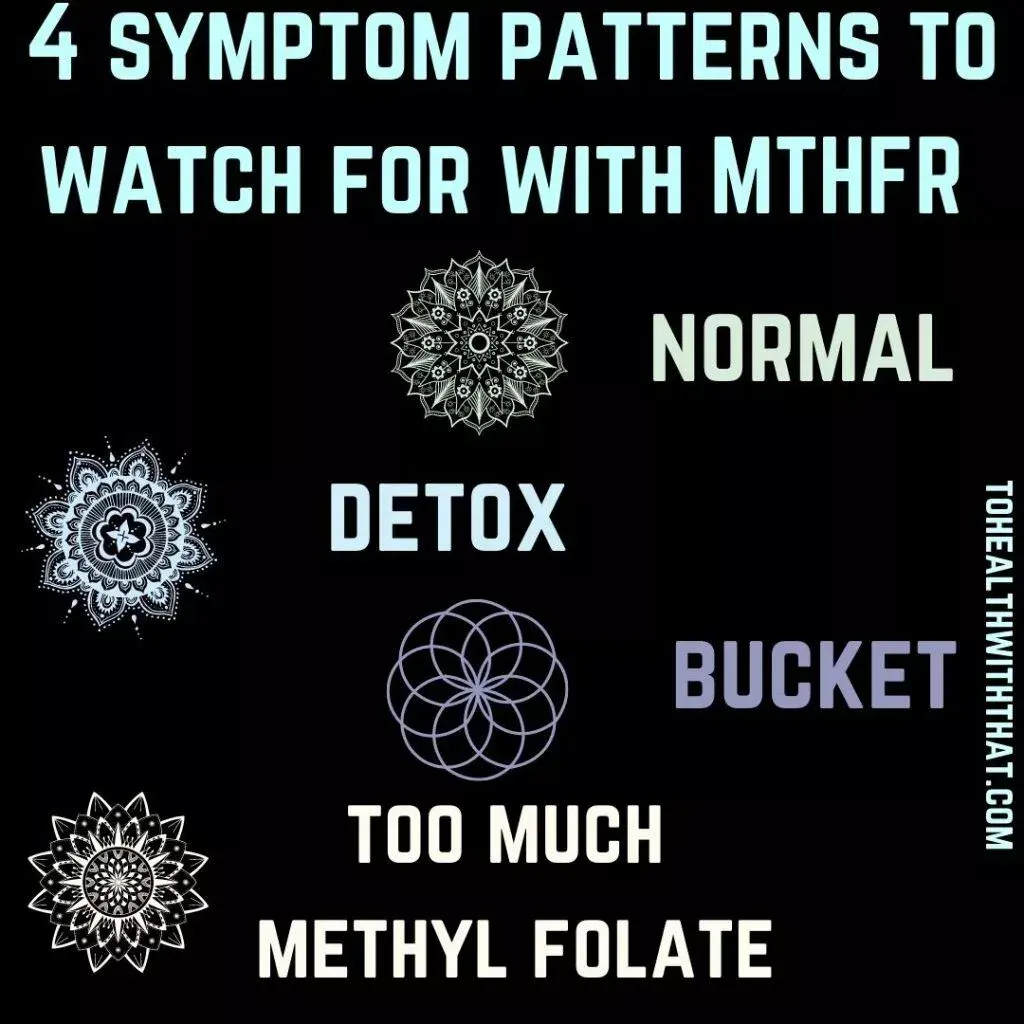I know, I know. I can hear you rolling your eyes at me already, but symptom tracking is a huge and valuable part of this journey, so just get used to me talking about it.
By now, I’m hoping you have a feel for how your symptoms usually look, and how they look when something is going on, or at least some inkling that there are times when different symptoms seem to get worse together. Part of this whole process is decoding which symptoms mean what for you, so that you can actually begin to tackle them.
Now, for women, we have the added complication that all of our symptoms tend to also change with our cycle, which can be hugely frustrating and make it a whole lot harder to keep track of what is doing what, but we’ll talk about that too.
For MTHFR specifically, there are a few patterns that I want you to watch for. Those are:
- Your normal
- Your detox symptoms
- Your bucket symptoms
- Your too-much methylation symptoms
- And for women who are menstruating, your hormonal symptoms.
Let’s talk about these one by one.
Your Normal Symptoms
These are, as you might expect, the things you struggle with on an ongoing basis. This is the easiest pattern to nail down because it’s probably why you started this journey in the first place. Chances are, you can already rattle these symptoms off no problem.

Your Detox Symptoms
These symptoms might be a little bit harder to nail down. Detox symptoms happen a lot on the MTHFR journey simply because most of the work around MTHFR deals with unpacking unfinished business out of your backlog and finishing it. Lots of the unfinished business is toxins that you just couldn’t get to the first time around. Detox comes up for us and it often mimics a mild hangover. There could be some irritability or easier frustration, brain fog, mild nausea or stomach upset, headaches, stiffness, or even a feeling of fullness or tenderness in your abdomen, especially around the right side where your liver lives. For me, there is always a good degree of achiness and joint pain, but that’s my body’s go-to distress signal.
Days with detox symptoms will seem to arise apropos of nothing. No warning, no real rhyme or reason, and typically without the fun that precedes a normal hangover. It can seem like you’re getting broadsided by these bad days, but it’s actually your body doing a lot of work and proverbially biting off more than it can chew. Unfortunately, I don’t know of any way to eliminate these days completely, but recognizing them can help you take some proactive steps to minimize your symptoms. It also helps to understand that your body is actually working on something good, not just randomly breaking down all over the place.
Some of recognizing this pattern will be just time and familiarity, and it really helps if you’re watching out for it. Geek out with your symptom tracker for a bit and see if you can spot some detox days.
Your Bucket Symptoms
Your bucket, if you’ll remember, is all of the stuff that your body has to deal with on a daily basis. This is the foods that you eat, the air you breathe, the water you drink, the stressors in your life, the chemicals you’re exposed to. This is the day-to-day junk.
Bucket symptoms, then, appear when your body has had to deal with more than it can handle. This means that an actual hangover, although it’s the classic detox symptoms, is actually a bucket symptom because this is what happens when you ingest too much of a toxin. So actually it’s legitimately detox and bucket. Bucket symptoms can also come up during allergy season – many of you are familiar with what that overflowing bucket feels like. Also, bucket symptoms can be the headache you get after walking through the perfume department of a store or from the fumes after you paint he house. They can also be symptoms that might arise after you eat a food that you’re sensitive to.
For example, I get bucket symptoms if I choose to eat wheat. I know I’m going to get them and I know they’re going to come up, but occasionally I choose to eat wheat anyway. These symptoms include a blocked nose, puffy face, stiff body, painful joints, and foggy disconnected brain. It isn’t pretty. I also get bucket symptoms in the perfume department and those are milder – more along the lines of headache, irritability, and brain fog.
These are symptoms that are a direct response to something you took in from the environment. Usually, these are easier to spot than other types of symptoms because you can spot the trigger too.
Your Too-Much Methylation Symptoms
At some time in this journey, every MTHFR person hits this wall. This is the I-took-too-much-methyl folate picture. It could also be caused by too much methyl-B12, or too much SAMe. In any event, these symptoms typically happen following a dosage change, so that can help you to identify them. Bear in mind that the symptoms aren’t always the day after the dosage change. They can easily be two weeks after a dosage change, which is why I like to take this journey so slowly and so methodically. If we go too fast, you might have increased your dose twice before the symptoms from the first increase show up. Believe me, that is a fresh hell you do not want to enter.
These symptoms typically look like anxiety, intrusive thoughts, increased frequency of panic attacks, manic energy, unpleasant energy, agitation, sometimes itchy/prickly/tingly feelings in your body, sometimes visual changes. It’s generally not fun, but all of us will be there at some point because part of getting through the backlog that comes up on the MTHFR journey is actually pushing your body to do it, and that means increasing your dose.
Your Hormonal Symptoms
Women on the MTHFR journey have an added complication, and that is our hormones. Now, having the MTHFR gene means we have a bit of a harder time processing hormones to begin with, and if you have a double-whammy with MTHFR and the COMT genes, well, sorry sisters. That means hormone processing is just going to be a bumpy road. I talk a bit about why MTHFR and estrogen are in bed together in Season 1, Episode 7, and if you want a refresher, that’s a good place to start.
For hormonal symptoms, it helps to combine your symptom tracking with period tracking so you can start to notice patterns. Now, most of us are familiar with the times of the month that are hardest for us so you probably know all about your hormone symptoms already, but occasionally you’ll find a symptom that is associated with your cycle that surprises you.
Typical hormone symptoms include cramping, bloating, acne, skin changes, mood changes, headaches, food cravings, even weight fluctuations. Less typical symptoms can be anything from swollen ankles to dizziness, to nausea. It all depends on your body. When you’re tracking be aware that symptoms can happen at any point in your cycle, we just know they’re hormonal because they happen at the same point in your cycle most months. It can be pre-menstrual, during your menses, during ovulation, or really any other time – the key here is that it repeats most cycles at that same time.

Okay – I Have Symptoms. Now What?
Knowing there are different symptom patterns can really help to bring some order into your life. Partly because when your body is doing something bizarre, you understand it a little bit better. It isn’t just another bad day, it’s a bad day because of something. Partly, also, because if you understand what is causing those bad days then we can take active steps toward fixing it. This is huge – all of a sudden you go from a person besieged by all kinds of bad days, to a person who is actually responding appropriately to those bad days and gaining control.
In the next few weeks, we’ll talk about some strategies around all of these different kinds of bad days and how you can learn to listen to what your body is telling you, and respond in a way that makes you and your body feel better. This is the start of a long and glorious communication with your body that can bring you to an entirely new level of health.
Thanks so much for listening today, and if you enjoy the show and want some different ways to connect, consider becoming a patron on Patreon. There is a patron-only podcast, if you’re interested, called MTHFR Stories. As you might guess, it’s stories from MTHFR folks just like you, ideas about what has been most helpful for them, and memories of their MTHFR experience. Thanks for listening!
MTHFR is a common genetic mutation that can contribute to anxiety, depression, fatigue, chronic pain, infertility, and more serious conditions like breast implant illness, heart attack, stroke, chronic fatigue syndrome, and some types of cancer. If you know or suspect you have an MTHFR variant, schedule a free 15-minute meet-and-greet appointment with MTHFR expert Dr. Amy today.
Book Your Appointment
